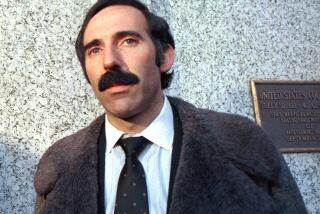Corporate Raider Bilzerian Charged With Stock Fraud
- Share via
NEW YORK — Corporate raider Paul A. Bilzerian was indicted Wednesday by a federal grand jury in Manhattan on 12 counts of securities and tax fraud and other violations stemming from four raids in 1985 and 1986.
The indictment, the latest to grow out of the government’s 2-year-old investigation of Wall Street corruption, hinges on secret deals between the flamboyant 38-year-old raider and Boyd L. Jefferies, the former chairman of the Los Angeles securities firm Jefferies & Co.
Jefferies, who pleaded guilty to securities violations last year, allegedly helped Bilzerian conceal his ownership of stock as Bilzerian initiated or plotted raids against apparel maker Cluett, Peabody & Co., construction concern H. H. Robertson Co., steelmaker Armco Inc. and Hammermill Paper Co.
The indictment, announced by U.S. Atty. Rudolph W. Giuliani in Manhattan, also accuses Bilzerian of conspiracy and of filing a variety of false documents related to the corporate raids. Although some of the alleged crimes seem like technical violations, in the government’s view they were clearly weapons that helped the takeover entrepreneur make millions by menacing corporate targets.
Bilzerian, who is also chairman of defense contractor Singer Co., denied the charges, saying in a statement: “I intend to fight this indictment, and I expect to be vindicated.”
The indictment was “the price I am paying for having become publicly identified with takeovers--a business activity concerning which the prosecutors in New York appear to have lost all perspective,” he said. “Not all takeovers are evil and . . . not all disputes over the adequacy of the tens of thousands of pages of highly technical filings required, and not every dispute with one’s broker, are proper causes for indictment.”
Last May, the Securities and Exchange Commission accused Bilzerian and shopping center magnate Edward J. DeBartolo of failing to disclose millions in loans and secret profit-sharing arrangements during takeover bids for Cluett, Peabody and Hammermill Paper.
DeBartolo was not mentioned in Wednesday’s indictment, which came on the same day that the investment firm Drexel Burnham Lambert tentatively agreed to plead guilty to six counts of fraud and pay $650 million to settle a criminal case being brought by Giuliani against it.
Giuliani said the investigation into the Bilzerian case is continuing.
The first of the deals scrutinized by the government was Bilzerian’s 1985 attempt to take over Cluett, Peabody for $336 million. The indictment charges that Bilzerian filed documents falsely stating that he used more than $20 million of his own money to purchase Cluett, Peabody stock.
In fact, the money was largely raised from “a small group of wealthy businessmen,” according to the indictment, which did not disclose the names of any of the alleged partners. Bilzerian’s net worth at the time was $6 million to $7 million, the indictment said.
Although the indictment gave no reason to explain Bilzerian’s allegedly false statement, takeover specialists have speculated that Bilzerian may have wanted to make it appear that he was wealthy enough to pose a serious takeover threat.
The indictment charges that, during the takeover bid, while he was buying some shares on the open market, Bilzerian was also secretly accumulating stock through Jefferies & Co.
Bilzerian bought 24% of Cluett, Peabody stock, then made a tender offer for the remaining shares. He ultimately made a $7-million profit when West Point-Pepperell, an apparel firm acceptable to Cluett, Peabody management, bought the company.
The second transaction was Bilzerian’s failed effort in April, 1985, to take control of H. H. Robertson, a Pittsburgh construction company. Bilzerian said he would pay $250 million for the firm and threatened to make a hostile tender offer if the company didn’t accept his offer.
As he did so, he sold 58,000 shares of his stock to Jefferies, the indictment alleges, with the understanding that he would buy it back, plus commission and interest, 31 days later. The move may have been intended to give Bilzerian tax-loss benefits, although the indictment does not explain his alleged motive.
The takeover flopped, and when Bilzerian reneged on his promise to repurchase the stock, Jefferies sold it for a $250,000 loss, according to the indictment. Later, Bilzerian paid $125,000 to Jefferies to compensate the firm for part of the loss and tried to conceal the payment by using false invoices, the indictment charges.
Jefferies also secretly accumulated stock for Bilzerian when the raider bid $900 million for Hammermill Paper in July, 1986, the indictment alleges. In this deal, Bilzerian concealed the fact that his financing included $8 million from a “wealthy businessman,” according to the indictment.
The indictment didn’t identify the businessman.
Bilzerian ultimately made $58 million on his Hammermill stock when the company was acquired by International Paper Co., the indictment says.
It charges that Bilzerian again used Jefferies to “park” stock when he began accumulating shares of Armco, a New Jersey steelmaker, in the fall of 1986. Although Bilzerian backed away from Armco before making a bid for the company, the 306,000 Armco shares parked with Jefferies appreciated by $575,000 while in Jefferies’ hands.
Bilzerian repurchased the shares from Jefferies, then sent the securities firm a phony bill for $575,000 to recoup its profits on the deal, the indictment says.
“Parking” is the name given to the practice of illegally concealing the ownership of stock for another person.
At a press conference, Giuliani refused to comment when asked whether Boyd Jefferies cooperated in the investigation of Bilzerian. But Jefferies is known to have been interviewed a number of times by prosecutors since March, 1987.
More to Read
Sign up for Essential California
The most important California stories and recommendations in your inbox every morning.
You may occasionally receive promotional content from the Los Angeles Times.













